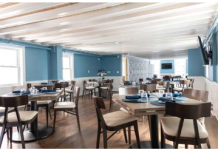By Jamie Jablonowski

Kaitlyn Ruitenberg of Monmouth Beach attends support group meetings with her dog using the online platform Zoom.
While many are struggling to avoid getting sick, those who suffer from mental health issues are at higher risk as services are shut down, and social distancing measures are in place. Fortunately, local organizations that serve these clients have quickly adapted to allow services to continue as best they can.
Josh Fenster, co-founder, and CEO of Seacrest Recovery Center in Eatontown, said, “While our nation is under a state of emergency due to the coronavirus, our commitment is to provide the safest environment for our clients and staff. At this time, we will continue to stay open and provide regular clinical services and onsite activities to our clients.”
They have put infection control measures in place, including sanitizing and disinfecting the facility, requiring staff and clients to wash hands and not allowing employees or clients with symptoms or diagnosed illness to return to the building until medically cleared.
“In addition, we are now offering our intensive outpatient clients treatment virtually from the comfort of their home,” said Nick Spinelli, chief marketing officer.
“We are working with each client and their families individually to provide the support that they need to continue on their journey through recovery,” added Carley Dietrick, business development representative.
Other organizations have had to limit in-person services and staff has quickly transitioned to meet the needs of their clients. Unity Place of Monmouth County in Oceanport offers mental health and addiction services to over 130 clients.
Many clients do not have access to the internet and they have relied on telephone communication to stay connected. “Without these services, these clients are at higher risk,” said Lorraine Laura, SCSW, director of Unity Place. “I have five case managers calling everyone daily to make sure they are staying safe.”
In addition to mental health services and social support, Unity Place provides two meals per day for clients. “We’ve brought food to some people who have no food. We had a couple of clients come here to get some food from us. We’re doing the best that we can in this situation,” Laura said.
The organizers and facilitators at Stephy’s Place, a support center for grief and loss in Red Bank, know the importance of keeping in touch with their members, especially in times of crisis and isolation.
“We asked our bereavement specialist, Kevin Keelan, to write a reflection every day,” said Sheila Martello, Stephy’s Place president. In addition to posting the reflection on the nonprofit’s website, a copy is emailed to each member and for those without email, a volunteer calls the member to recite the message. A meditation message from the group’s mindfulness consultant is also shared.
In addition, group facilitators contact members of the groups weekly. Many of the groups meet virtually using platforms such as Zoom for remote conferencing; some members keep in touch through email, sharing their thoughts, fears and reflections. Others without internet access are using old-fashioned phone calls to stay in touch. “We couldn’t leave anyone out.”
“My hope is that this feeling of understanding grief will help our society be less mourning-avoidant,” said Martello, who lost her husband in the Sept. 11, 2001 terrorist attacks. She says we are a “grief avoidant society.”
“Now we are all forced to deal with the grief. And through that grief will be growth.”
Kaitlyn Ruitenberg of Monmouth Beach is pursuing a graduate degree in social work at Monmouth University, works at a local substance abuse recovery center, and is in recovery herself. “It’s difficult for patients because the patient still needs the service your providing,” she explained. “However, meeting in person is challenging because there are clients that are scared to be in a place where people are congregating together.”
Personally, Ruitenberg has taken advantage of the online support groups that are now available. “The whole fellowship went online within a week,” she said, adding that “the opportunity to still attend meetings online has been instrumental in keeping people calm and connected during the crisis.”
“For 12-step groups, fellowship is important. Isolation normally leads to relapse for a lot of individuals, so it is important to feel connected and not alone in times like these, especially for those with substance abuse disorders,” said Ruitenberg. As with other programs, individuals without access to a computer can call into these meetings via phone.
Integrated Care Concepts and Consultation is a comprehensive mental health center offering a wide range of services, including psychiatry, psychotherapy and meditation. It has four locations, including local offices in Middletown and Eatontown. Providing an average of 2,300 sessions per month, it has had to make dramatic changes to its business in the past few weeks.
Seth Arkush, LCSW, MBA, managing partner of Integrated Care Concepts and Consultation, reported 90 – 95 percent of services are now conducted remotely. For those individuals who require in-person sessions, social distance guidelines are strictly followed and the facilities are professionally disinfected.
Arkush reminds individuals that fear is normal. “It’s reasonable to be highly anxious and afraid. I’m experiencing that myself. I have a business to run. Am I losing money? Have I been exposed without knowing it yet? There are all of these fears we have. If we’re only focusing on the problem, the thing we are afraid of, we compound that fear.”
He added that having a plan is important. “When we have the plan, our anxiety goes down from a 10 to a five. It won’t go to zero. You would be crazy if you were not afraid,” he said.
All mental health professionals interviewed encouraged the community to reach out for help if needed during this time. Additional resources include the Substance Abuse and Mental Health Services Administration website at samsha.gov and Online Intergroup for Alcoholics Anonymous at aa-intergroup.org for on-line meetings.
Apps are also available for those with smartphones. Popular apps for mental health and substance abuse include Talkspace, BetterHelp Counseling and Pocket Rehab.
In these unprecedented and challenging times, our physical body is not the only part of ourselves that is at risk. As support services adapt to a new landscape, it is reassuring to know that assistance is out there to help our community cope. If you are struggling, help is only a phone call or click away.
This article originally appeared in the April 2nd, 2020 print edition of The Two River Times.














